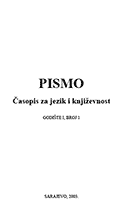Upotreba mocionih sufiksa (u nomina agentis et professionis) u savremenom razgovornom bosanskom jeziku
The use of motional suffixes (in nomina agentis et professionis) in contemporary conversational Bosnian
Author(s): Amela ŠehovićSubject(s): Language and Literature Studies
Published by: Bosansko filološko društvo
Keywords: mocioni sufiksi; privativna opozicija; integralna imenička mocija; supletivna imenička mocija
Summary/Abstract: The aim of this research was to investigate the use of suffixes which declare masculine or feminine gender of nomina agentis et proffesionis – by native speakers of the Bosnian language. According to questionnaires: 1. The most frequent suffixes in that role are: -ica, -ka, -teljica, -teljka. 2. Native speakers also use the following suffixes, although not so often: -kinja, -inja, -arka, -a, -esa. 3. Suffix -teljica is more often in use today than earlier. 4. Nouns with suffixes -esa and -a are very stylisticly marked and therefore they are not so popular with the native speakers. This fact shows the importance of relation between linguistic and nonlinguistic elements / factors. 5. The research shows that native speakers of the Bosnian language very often use this kind of suffixes in everyday communication. This use is in many cases (for example, for university teachers) opposed to the attitudes of the official grammar. If we know that in many European languages there are lists of politicaly correct words (especially in the domain of nomina agentis et proffesionis), then it is out of keeping with modern political and linguistic attitudes. Namely, if we can form a noun with suffixes for men and women nomina agentis et proffesionis, and our Slavic language with its structure allows that in almost all cases, why should we do anything but that?
Journal: Pismo - Časopis za jezik i književnost
- Issue Year: 2003
- Issue No: 01
- Page Range: 73-92
- Page Count: 20
- Language: Bosnian

